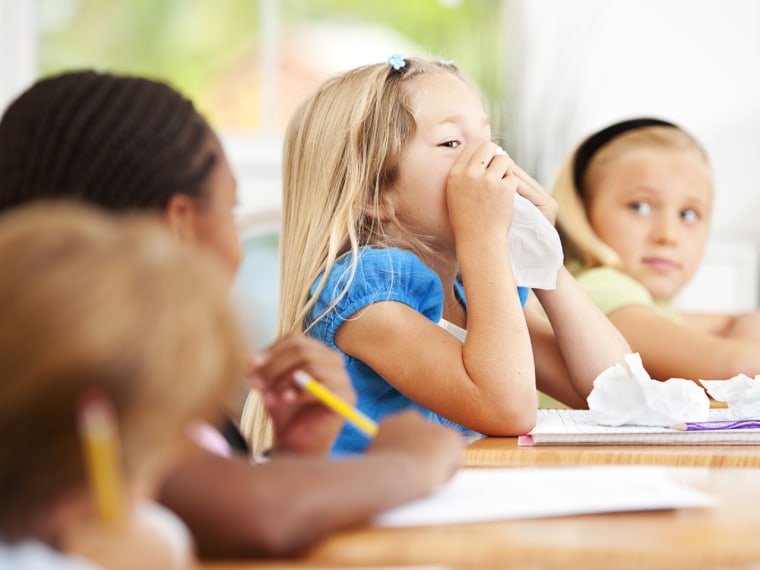Round Meadow Elementary School gives awards to the handful of students who make it through an entire school year with a perfect attendance record – that means no absences, no tardies, and no early sign-outs. (No exceptions.)
But the school, in Hidden Hills, Calif., may change its policy for the 2013-14 school year, says principal Jeremy Resnick. The flu has hit students and staff hard this year, and he doesn’t want to encourage kids to come to school, or their parents to send them, when they have a potentially contagious disease.
Despite automated phone calls reminding parents that their children should stay home if they have a fever, vomiting or diarrhea, “we think there are probably people who are sending their kids to school when they shouldn’t,” he says.
That's one of the reasons many schools ditched that type of award because of the 2009 H1N1 flu pandemic, says Andrea Vazzana, a child and adolescent psychologist at the NYU Langone Medical Center. And others, like Round Meadow, are reconsidering in light of this year’s flu and norovirus outbreaks.
For now, the award is in place, but Resnick says he tries to keep it low key – a paper certificate and maybe a gift certificate to a local restaurant – so as not to make it too tempting to come to school sick. Fewer than a dozen of the school’s 550-odd students get the award each year, and out of nine elementary schools in the district, Round Meadow is one of the only schools to still have an annual perfect attendence.
Schools are right to be cautious. Like offices, classrooms and hallways are great places for infectious diseases to spread, with close contact between students and plenty of shared surfaces. (Let’s not even talk about the nose-picking and pencil-sucking habits of younger kids.)
In an attempt to figure out exactly how students interact in ways that might promote disease spread, the Centers for Disease Control and Prevention has funded research to track students’ contact patterns. The studies rely on self-reported activity logs as well as sensors that record when one student is within sneezing or coughing distance of another.
The CDC advises people with flu-like illness to stay out of schools until their fever has dropped to below 100 degrees – without medication – for 24 hours, and public health officials say people should follow that advice.
“What you’re really trying to teach [students] is to be responsible, and part of responsibility is to not get other people sick,” says Georges Benjamin, executive director of the American Public Health Association.
Yet doctors also want schools to continue to encourage kids’ school attendance. “There’s a strong correlation between education and your health,” says Benjamin.
To inspire kids to come to school, but also to stay home when they’re ill, many schools have altered their rewards, such as offering awards for “excellent” – say 95 percent -- rather than “perfect” attendance, says Vazzana.
Hedy Chang, director of Attendance Works, a policy group that works to reduce chronic absence, says schools should reward good or improved attendance rather than take an all-or-nothing approach. That tack can discourage a child who, say, falls ill during the first month of school and then knows she has no chance of winning an award for the rest of the year, she says.
Gennesaret Sealy managed to make it from kindergarten through twelfth grade without ever missing a day of school, or even being tardy. She didn’t do it for a gift card or a trip to an amusement park or even a paper certificate, just as a personal achievement. (Her older brother managed the same feat.)
Sealy, now 19 and a freshman at the University of Alabama, says she never went to school sick in order to maintain her perfect record. “Maybe I had a cold or a headache, but nothing that would keep me down or make me debilitated,” she says.
That kind of resistance to infectious diseases is probably a combination of healthy lifestyle habits, good genes, great personal hygiene and a healthy dollup of luck, doctors say.
Kids who want to duck infectious diseases – and maybe maintain an attendance streak – should start by getting all their recommended vaccines, says Dr. Mandy Allison, a pediatrician at the University of Colorado Denver. They should also wash their hands frequently, get enough sleep and eat a healthful diet.
Related stories:
Flu season killing record number of older Americans, CDC says
